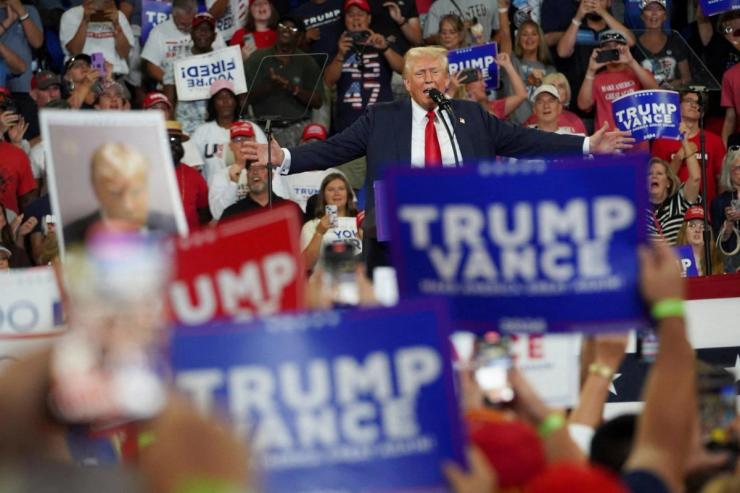The News
The alleged Iranian hack of Donald Trump’s orbit continued at least until mid-September and may be ongoing, a document the hackers shared with a progressive publication reveals.
Iranian authorities have denied any involvement in the efforts to leak internal documents from Trump’s campaign, which have reportedly been sent to major US publications including Politico and The New York Times, and to the Biden campaign. But the campaign and outside analysts have blamed the hack on the Iranians, who have ample reasons for hostility to the former president and also allegedly plotted his assassination.
The publisher of the newsletter Popular Information, Judd Legum, writes this morning that a source under the name “Robert” shared a set of documents with him. Those included a research dossier on JD Vance matching other publications’ descriptions of the hacked material.
But the leak also included a legal letter to The New York Times complaining about an article that raised questions about the validity of Trump’s image as a successful businessman.
The letter was dated Sept. 15. While the letter has not been published anywhere online, a person at the Times confirmed to Semafor it had been sent with that date.
The date on the letter indicates that the hack is larger and more recent than previously reported — and may still be underway.
Trump spokesman Steven Cheung didn’t comment on the widening breach but said the hack indicates that Iran “is terrified of the strength and resolve of President Donald J. Trump.”
In this article:
Know More
Legum writes that “it was tempting to use this opportunity to turn the tables on the Trump campaign and publish the stolen campaign materials provided to me by Robert. But I believe that is the wrong approach.”
“The internal Trump campaign documents obtained by Popular Information may be embarrassing or problematic to members of the Trump campaign. Some of the documents have news value. But the stolen materials do not provide the public with any fundamental new insight about Trump or his campaign. So, on balance, the relevant factors argue against publication,” he wrote.
That’s the same decision that major publications reached on other documents, and I think that’s the right call when it comes to the document Legum shared with me.
Ben’s view
The media’s caution with the Trump hack is obviously ironic: The lessons we learned at Hillary Clinton’s expense in 2016 will now benefit Trump, who cheered the Russian hacking operation.
But the details of the situation also reveal how complex and gray these decision about publication are — multifactor balancing acts more than matters of black-and-white ethics.
Purists may say that journalists should ignore sources’ motivations, which run the gamut from pure-hearted whistleblower to disgruntled employee to intelligence agency of an adversarial power.
But in reality, editors constantly balance those questions with newsworthiness, and the refusal to publish the Trump leaks reflects a presumption against publishing the product of spies’ hacks — but not a hard rule against it.
These appear to have been, so far, easy calls. I wouldn’t have posted the legal letter if Trump’s campaign sent it as a press release, and so I obviously won’t cover its substance as the product of a hack.
But unsettled questions remain. For instance, what about the product of American espionage? American journalists don’t exactly scruple to print intercepts of Russian communications leaked by the US government.
Legum, at least, has done something that major American publications hanging onto the Trump leaks haven’t: He’s explained himself, in context. Democrats are rightly furious at, for instance, Politico for its 2016 live-blog of Wikileaks trivia. The US media has, I think (and Legum also writes), made a real mistake in failing to reckon with the errors of 2016, and to explain its current decisions fully in that light.
(I was editing BuzzFeed at the time, and we were more restrained but not perfect. We wrote a half-dozen stories off Wikileaks, and tried to foreground the news of the Russian attack itself — a far bigger story than the substance of the leaks. I recall deciding that excerpts of a secret Hillary Clinton speech, released by hackers to distract us from the Access Hollywood scandal, were clearly newsworthy, and we reported on them. But it’s not the kind of reporting you feel great about, and not everything we published meets that bar.)
I was, coincidentally, on a panel at NYU’s Arthur L. Carter Journalism Institute’s Ethics and Journalism Initiative last week to discuss these questions, and the editors there agreed that these are hard decisions. There, the former executive director of the Committee to Protect Journalists, Joel Simon, suggested, mostly in jest, that perhaps the target of the hack wasn’t really the Trump campaign at all.
What better way to attack the American press, he asked, than to give us boring, useless leaked documents that they would feel obliged not to publish — and then leave themselves open to a new attack for participating in a cover-up?
That’s an argument for, at least, some kind of transparency about how we make our decisions.
Room for Disagreement
“It is a bit rich for legacy media institutions to be acting so stuffily responsible when it’s Trump (apparently) getting the hack-and-leak treatment,” wrote The American Prospect’s Ryan Cooper, under the headline, “Dear Hackers: Please Send Me the Trump Campaign Emails.” He concluded: “If anyone on earth has earned some gossipy tabloid coverage of his personal communications, it’s him.”
Notable
- “If it seems hard for the media to win here, then that might be the point,” writes CJR’s Jon Allsop. “Foreign hacking operations are best understood as part of a broader campaign of informational terrorism, the impact of which is tied less to the newsworthiness of any particular hacked document than its wider ability to sow chaos and uncertainty.”
- “Any media or news outlet reprinting documents or internal communications are doing the bidding of America’s enemies and doing exactly what they want,” Trump spokesman Steven Cheung said of the initial leak.
- The Department of Justice is planning to bring criminal charges against the hackers.
- “While I’d like to think that what we’re seeing in the media’s silence about the Iran hacks is mostly ‘lesson learned,’ I’m not convinced. That’s probably one element, with the lack of urgent newsworthiness a bigger part, combined with a desire — however unacknowledged, even to themselves — to avoid inflaming right-wing criticism,” Margaret Sullivan argues.


